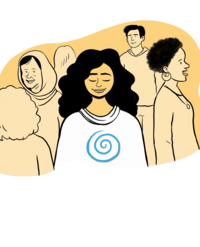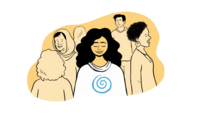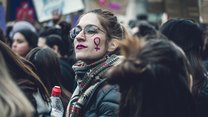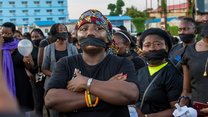Our commitment to women’s rights: working at all levels
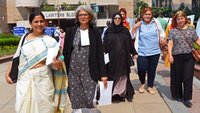
With our active commitment to women’s rights, we are assisting survivors of sexualised violence to live in dignity, in justice and free of violence. We work at all levels to achieve this. After all, there are varied levels to the causes and consequences of violence. These have to be addressed at the levels of individuals, families, institutions, governments and society. So the foundation of our work is our Multi-level Approach to Prevention of and Protection from Violence. Based on this, we pursue our objectives of protecting women in conflict and post-conflict regions and enforcing their rights.
Our psychosocial counselling: trauma-sensitive and in solidarity
Women and girls who have experienced sexualised violence suffer both physical and psychological effects. In addition, they also often experience denigration and ostracism from their families and immediate environment. Survivors need more than just psychological assistance: there is a need for a psychosocial approach that promotes solidarity between survivors and also involves their families and social surroundings.
Enhancing the establishment of local psychosocial measures
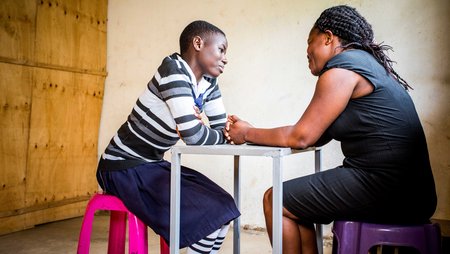
In most conflict regions there is an absence of functioning support measures on offer from the state. There are only a few trained psychological or psychosocial specialists. And any assistance that is on offer is generally not designed for the specific needs of women who experienced violence. For this reason, medica mondiale supports the establishment of psychosocial counselling measures in (post-)conflict regions. Our programmes promote psychosocial work based on principles of solidarity, and create access to counselling for women and their families.
Asserting the right to sexual and reproductive health
Gender-based violence and other practices that violate human rights, such as forced marriage or female genital mutilation, are some of the most significant risks to the health of women and girls around the world. One priority in our programmes is informing and educating women and girls about their sexual and reproductive health and their right to access appropriate healthcare services. We create access to medical advice and treatment. In our advocacy work in both Germany and our priority regions, we work to ensure the establishment of trauma-sensitive healthcare provision, and for legal access to safe pregnancy termination, emergency contraception and other services for sexual and reproductive health of survivors.
Ensuring access to legal assistance, enabling prosecution
Women and girls only rarely benefit from statutory protection or legal assistance when they have been subjected to sexualised violence. Cases involving violence are often dealt with ‘out of court’ in negotiations between authorities, families and perpetrators, without respecting the dignity, rights and wishes of the survivors. This is why we provide access to legal advice and representation. In Afghanistan, the legal assistance project offered women until 2021 trauma-sensitive legal advice, free of charge. Female lawyers assisted women to take perpetrators of violence to court or seek financial reparation. They also represented them in divorce and custody hearings. In West Africa medica Libera supports women and girls when they seek to assert their rights, when it comes to inheritance or property, for example.
Ensuring access to training, income and resources
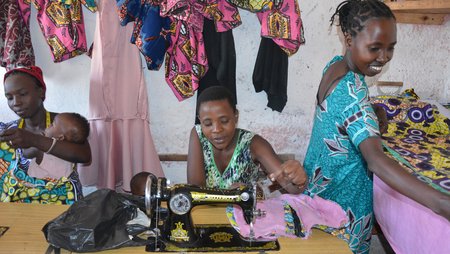
Access to training, work and vital resources such as land, water or seeds are of essential importance to women and girls. Economically relevant resources are needed by women to ensure their own survival and that of their children. Gaining access to them can be a way out of the spiral of poverty and violence. Our programmes create access to education and training, as well the chance to establish savings groups or small enterprises. In the DR Congo or Burundi, women are being trained in tailoring and the building trade. In Bosnia, women are gaining prospects for the future after training and setting up businesses in agriculture.
"People respect me and I feel like I belong again."
Strengthening the voices of survivors
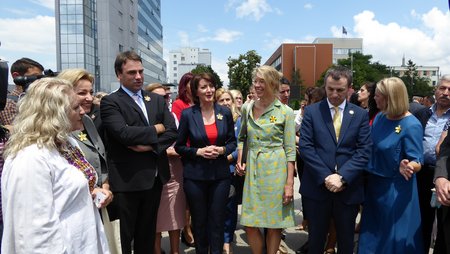
A culture of acknowledgement and reconciliation cannot be developed unless the perspectives of survivors of sexualised wartime violence are included in efforts to process the past. Approaches taken in our national and regional programs help women’s rights organisations to network and support each other as they campaign for the perspectives and needs of survivors to be incorporated into national and regional initiatives on coming to terms with the past. It is our aim to make sure their voices are heard and to assert their right to truth, reparation and social justice.
Training institutions how to deal with survivors
Women and girls who have experienced sexualised violence are often stigmatised by staff at institutions and authorities when they seek the support they are entitled to. When survivors go to hospitals, police stations or court, they are frequently met with discrimination or even renewed violence. A priority of the programs we conduct together with our partner organisations is to train specialist staff and governmental institutions to adopt a Stress- and Trauma-sensitive Approach when dealing with people affected by violence. At the same time, we advise institutions how to anchor stress- and trauma-sensitivity in their processes and procedures. At an international level, we contribute our insights to the work of specialist committees in order to have a long-term influence on international guidelines for healthcare policy.
Awareness-raising, protests and overcoming gender roles
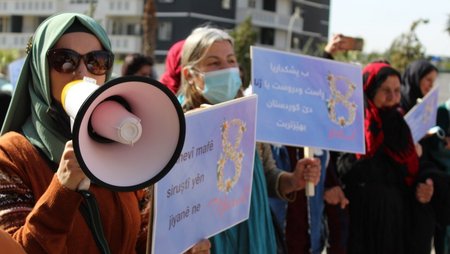
Stereotypical gender roles are harmful to both the individual and society. We question sexism and stereotypes, working towards a change throughout society. We support the work of our partner organisations, who are tirelessly and decisively provoking public dialogue on roles and power relations of the genders, accompanying this with awareness-raising and anti-discrimination protests. With public relations, campaigns and actions at the levels of communities, institutions and politics, we can contribute to social and political change.
"I feel strong and am sure I can raise my daughter to know the right values."
Removing laws that discriminate against women
Gender-specific inequality is often anchored in laws and the ways of working within institutions that enact these laws. It is our aim to remove these discriminatory laws and support efforts to implement reforms. One milestone in the struggle for women’s rights was the retention of the Elimination of Violence against Women Law passed in 2009 in Afghanistan. In co-operation with national and international women’s rights and human rights organisations, Medica Afghanistan was able to defeat efforts to remove the law in 2016. And in 2017 they successfully campaigned for a ban on so-called virginity tests. In Liberia, our partner organisation is supporting the historic reform of land rights which will, for the first time, grant women an equal right to claim the land of their ancestors and rights of use for this.
Recognising war crimes, campaigning for reparation laws
Wartime rapes adversely affect the physical and psychological health of survivors over a period of years or even decades. Most of these women never receive any political acknowledgement or official compensation for their suffering. However, the advocacy successes of our partners have shown that it is actually possible to enact laws that grant reparations. As part of an alliance with other civil society groups, our Iraqi partner EMMA successfully advocated for a law to compensate Yazidi survivors of sexualised violence committed by the IS. And in Kosovo in 2017 it became possible for women who survived wartime rape to claim the status of war victim, entitling them to a monthly pension. Since then, our partner organisations have been providing assistance to survivors during the application procedures.
Protecting and supporting women’s rights defenders
During and after conflicts, the work of women’s rights defenders becomes more important than ever. They ensure the needs of women and girls are met, identifying and counteracting gender-based violence. For this, they are often rewarded with defamation, hindrances in the form of repressive legislation, threats and even murder. We support vulnerable activists by providing unbureaucratic help. We call on governments around the world, including Germany, to protect and support all human rights defenders.
In Germany, too: Political women’s rights work
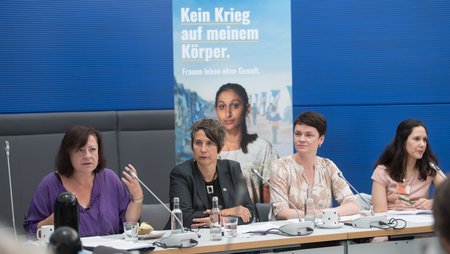
As a women’s rights organisation we are committed to feminist policies to deal with sexualised violence: We raise these demands and those of our partner organisations with government and with the public. Whether in Germany or at the UN Security Council: We call for governments to assume responsibility for the protection of women and girls during armed conflicts and their equal participation in peace processes.
We work towards the adoption of feminist principles in foreign and human rights policy. We raise awareness of the causes and consequences of sexualised violence and ensure measures are taken to combat them.
